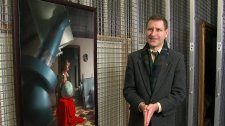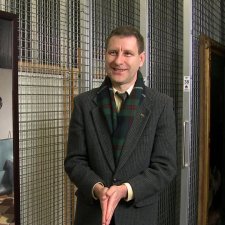Professor Penny Sackett, Australian National University and former Chief Scientist for Australia (2008-2011) talks about her life in science.
This video was produced with funds donated by Tim Fairfax AC.
Professor Penny Sackett, Australian National University and former Chief Scientist for Australia (2008-2011) talks about her life in science.
This video was produced with funds donated by Tim Fairfax AC.
Penny: Goodness, how to describe a life in science and, you know, in a few minutes. I guess it began as a curiosity as a child, in fact I rather think that all children are born scientists, you know? All it really takes is curiosity and logic, which I think children are actually very logical. And a little bit of dedication, and children actually display that in quite some measure, I think, and that’s certainly how it began for me, and I was reinforced by a wonderful, wonderful physics teacher in secondary school.
I’ve been accused of being a generalist, which I’m happy to accept as a label. It might be because I lack focus sometimes, but I think, in my mind, I’d rather describe it as the fact that there’s so much to understand and experience in so short a life that it’s hard to choose. And so I’ve mixed in my science, I’ve been fortunate to study a variety of things, like the ion channels that are responsible for how our nervous system triggers; to discovering planets around distant stars and solar systems quite unlike our own. Studying the atmosphere of Saturn. All of these things have intrigued me, and I think that science has really given me more than I’ve given back.
That is really what a life in science is, is a life enriched by that interaction, what it gives you, and the little tiny bit that you hope you can give back. I’ve been lucky enough to visit all of the continents of the earth except Antarctica, and I haven’t given up hope on Antarctica yet. It’s given me an opportunity to use wonderful tools, which, in fact, were also generated by science, in a way. So, massive supercomputers which are sort of an extension of our own brains, able to calculate millions of possibilities; wonderful telescopes that are an extension of our eyes, and it’s really a wonderful experience to be able to sit there at night and direct this telescope. They’re silent things, they’re very quiet; and be able to direct this giant eye to look into a very, very small piece of space, the particular piece that you want to look at that night; and realising that the physics and the chemistry, the laws of chemistry and physics are actually the same – you know, thousands of light years distant – as they are here on this earth. And I think that’s a pretty remarkable thing. The manifestations are quite different, they can be manifest in our bodies, in the oceans, planetary motions, the nuclear furnace of the sun. But it’s all the same science, all the same laws of physics and chemistry. And that gives you something, you know, that gives you a sort of continuity of looking at the world and feeling part of a larger whole.
So I don’t want you to think that all of my experiences are through the lens of science, but indeed many of them are, I mean when I look at a painting, I can’t help but think that the elements that make up the colours, the cadmium and the tin and the chromium, and all those wonderful elements that give the paint its colour were actually born in the interiors, the nuclear furnaces of stars, as were most of the elements of our own bodies, so, when you look up at the sky, you’re really looking at our birthplace. That’s really where our bodies were born, in some sense.
So it does give you a different perspective, being a scientist. And I suppose through that life, my language has been the language of physics and mathematics and reason, but people often don’t realise how passionate scientists can be, as well. And I think a life well lived requires reason in passion, and I thought if I might, I’d just like to read a short passage from a poet, a philosopher, and actually a painter of the last century named Kahlil Gibran. And I’d like to read what he has to say about reason and passion, if I might.
"Your reason and your passion are the rudder and the sails of your seafaring soul. If either sails or your rudder be broken, you can but toss and drift, or else be held at a standstill in mid-seas. For reason, ruling alone, is a force confining; and passion, unattended, is a flame that burns to its own destruction. Therefore, let your soul exalt your reason to the height of passion that it may sing; And let it direct your passion with reason, that your passion may live through its own daily resurrection, like the phoenix rises above its own ashes." Reason and passion, science and art. The best of both, observe patiently, communicate honestly, we put voice to our experience and make wings of our sails. I guess they weave meaning and understanding into our lives, and that’s really why we celebrate both.



Professor Penny Sackett and artist Andrew Mezei describe the process behind making the portrait.



Artist Andrew Mezei talks about his art practice and the process behind his portrait of Professor Penny Sackett.



Visit us, learn with us, support us or work with us! Here’s a range of information about planning your visit, our history and more!